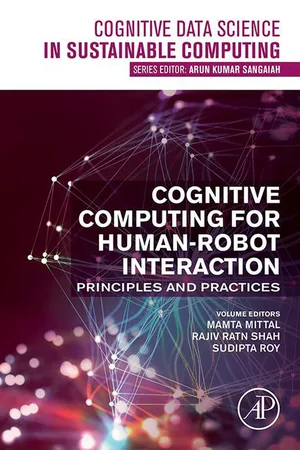
eBook - ePub
Cognitive Computing for Human-Robot Interaction
Principles and Practices
- 418 pages
- English
- ePUB (mobile friendly)
- Available on iOS & Android
eBook - ePub
Cognitive Computing for Human-Robot Interaction
Principles and Practices
About this book
Cognitive Computing for Human-Robot Interaction: Principles and Practices explores the efforts that should ultimately enable society to take advantage of the often-heralded potential of robots to provide economical and sustainable computing applications.
This book discusses each of these applications, presents working implementations, and combines coherent and original deliberative architecture for human–robot interactions (HRI). Supported by experimental results, it shows how explicit knowledge management promises to be instrumental in building richer and more natural HRI, by pushing for pervasive, human-level semantics within the robot's deliberative system for sustainable computing applications.
This book will be of special interest to academics, postgraduate students, and researchers working in the area of artificial intelligence and machine learning.
Key features:
- Introduces several new contributions to the representation and management of humans in autonomous robotic systems;
- Explores the potential of cognitive computing, robots, and HRI to generate a deeper understanding and to provide a better contribution from robots to society;
- Engages with the potential repercussions of cognitive computing and HRI in the real world.
- Introduces several new contributions to the representation and management of humans in an autonomous robotic system
- Explores cognitive computing, robots and HRI, presenting a more in-depth understanding to make robots better for society
- Gives a challenging approach to those several repercussions of cognitive computing and HRI in the actual global scenario
Tools to learn more effectively

Saving Books

Keyword Search

Annotating Text

Listen to it instead
Information
Table of contents
- Cover
- Title page
- Table of Contents
- Copyright
- Contents
- List of contributors
- About the editors
- Preface
- List of Illustrations
- List of Tables
- Chapter 1 : Introduction to cognitive computing and its various applications
- Chapter 2 : Recent trends towards cognitive science: from robots to humanoids
- Chapter 3 : Cognitive computing in human activity recognition with a focus on healthcare
- Chapter 4 : Deep learning-based cognitive state prediction analysis using brain wave signal
- Chapter 5 : Electroencephalogram-based cognitive performance evaluation for mental arithmetic task
- Chapter 6 : Trust or no trust in chatbots: a dilemma of millennial
- Chapter 7 : Cognitive computing in autonomous vehicles
- Chapter 8 : Optimized navigation using deep learning technique for automatic guided vehicle
- Chapter 9 : Vehicular middleware and heuristic approaches for intelligent transportation system of smart cities
- Chapter 10 : Error Traceability and Error Prediction using Machine Learning Techniques to Improve the Quality of Vehicle Modeling in Computer-Aided Engineering
- Chapter 11 : All about human-robot interaction
- Chapter 12 : Teleportation of human body kinematics for a tangible humanoid robot control
- Chapter 13 : Recognition of trivial humanoid group event using clustering and higher order local auto-correlation techniques
- Chapter 14 : Understanding the hand gesture command to visual attention model for mobile robot navigation: service robots in domestic environment
- Chapter 15 : Mobile robot for air quality monitoring of landfilling sites using Internet of Things
- Chapter 16 : Artificial Intelligence and Internet of Things readiness: inclination for hotels to support a sustainable environment
- Chapter 17 : Design and fabrication of an automatic classifying smart trash bin based on Internet of Things
- Index
- A
Frequently asked questions
Yes, you can cancel anytime from the Subscription tab in your account settings on the Perlego website. Your subscription will stay active until the end of your current billing period. Learn how to cancel your subscription
No, books cannot be downloaded as external files, such as PDFs, for use outside of Perlego. However, you can download books within the Perlego app for offline reading on mobile or tablet. Learn how to download books offline
Perlego offers two plans: Essential and Complete
- Essential is ideal for learners and professionals who enjoy exploring a wide range of subjects. Access the Essential Library with 800,000+ trusted titles and best-sellers across business, personal growth, and the humanities. Includes unlimited reading time and Standard Read Aloud voice.
- Complete: Perfect for advanced learners and researchers needing full, unrestricted access. Unlock 1.4M+ books across hundreds of subjects, including academic and specialized titles. The Complete Plan also includes advanced features like Premium Read Aloud and Research Assistant.
We are an online textbook subscription service, where you can get access to an entire online library for less than the price of a single book per month. With over 1 million books across 990+ topics, we’ve got you covered! Learn about our mission
Look out for the read-aloud symbol on your next book to see if you can listen to it. The read-aloud tool reads text aloud for you, highlighting the text as it is being read. You can pause it, speed it up and slow it down. Learn more about Read Aloud
Yes! You can use the Perlego app on both iOS and Android devices to read anytime, anywhere — even offline. Perfect for commutes or when you’re on the go.
Please note we cannot support devices running on iOS 13 and Android 7 or earlier. Learn more about using the app
Please note we cannot support devices running on iOS 13 and Android 7 or earlier. Learn more about using the app
Yes, you can access Cognitive Computing for Human-Robot Interaction by Mamta Mittal,Rajiv Ratn Shah,Sudipta Roy in PDF and/or ePUB format, as well as other popular books in Computer Science & Artificial Intelligence (AI) & Semantics. We have over one million books available in our catalogue for you to explore.